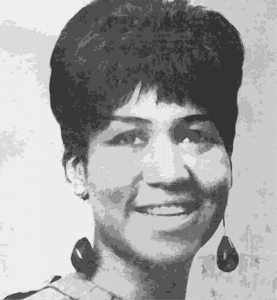06 Jul LIFE GIVES ARETHA A GOLDEN SPIN
IF THERE EVER WAS any doubt that Aretha Franklin is the most significant pop happening since the Beatles, Time Magazine’s recent cover story on the soul singer has done much to dispel it.
Pointing out that Aretha is the epitome of soul music and vice versa, the weekly news magazine devoted five pages to the unprecedented selling power of nitty-gritty rhythm and blues in the pop record marketplace. Soul is where it’s at, and Aretha Franklin is soul’s sweetest voice.
The 26-year-old daughter of a Detroit Baptist evangelist, Aretha has come a long way—in fame, fortune and technique—since joining Atlantic Records 18 months ago. When she comes to Toronto’s Maple Leaf Gardens on Sunday, Aug. 18, she’ll be guaranteed a reported $20,000—more than any artist in the lucrative pop one-nighter business.

Aretha has received an incredible seven gold records during her short, but fruitful association with Atlantic. Her newest album, Aretha Now, is well on the way to earning her another gold disc, after just a few days of release. In this fourth Atlantic album, Aretha has successfully endeavored to lean heavily on the gospel idiom (from which much of her inspiration is derived) while maintaining enough sophisticated elements of contemporary blues to keep the average pop fan content.
Her current hit single. Think, is featured along with its B side, a driving uptempo rendition-of Sam Cooke’s You Send Me. Probably the most successful and stimulating selection in the album is Aretha’s gospel-tainted version of the recent Dionne Warwick hit, I Say A Little Prayer.
Dionne is no run-of-the-mill song stylist herself, yet Aretha has breathed something new and unique into the song, giving it added dimension. Rarely does she take the lead vocal of the Bacharach-David tune; instead she leaves the lyric explanations to her excellent vocal group, the Sweet Inspirations, all the while punctuating the message with joyful cries of “forever!”

CHRIST YOU KNOW IT AIN’T EASY
JOHN AND YOKO’S BATTLE FOR PEACE
There’s ample reason to believe that this is one of the most effective vehicles yet uncovered for Aretha’s outstanding talents. As is customary with an Aretha Franklin album, the soulster lends her style to several R & B standards. In Aretha Now, the standard material includes Don Covay’s See Saw, Night Time is the Right Time (made famous by Ray Charles) and the Sam and Dave evergreen, I Take What I Want.
Night Time appears, at least initially, to be most suited to Aretha’s gasping gospel delivery, and she endows it with all the joy and earthiness which abounds in the Negro culture. It’s doubtful if even Ray Charles could generate such uninhibited fervor.
Of the new material unveiled in the album, Hello Sunshine, a song written by saxophonist King Curtis (who returns to Le Coq’D’or on July 27) looms as the most likely single. Ronnie Shannon, who penned the million-selling Baby I Love You, has two worthy new contributions in Aretha Now—You’re A Sweet Sweet Man and I Can’t See Myself Leaving You.
In the latter, Aretha for the first time has displayed a degree of innocence and naivety which had previously been lacking in her oh-so-experienced and I’ve-seen-it-all approach. The melody line is especially evocative, giving promise of a possible single release.
The remaining offering of the album is another original, simply titled A Change, in which Aretha completely surrenders to her gospel background. It is the hope and dream of love’s salvation; the light is ahead and Aretha reaches out and grasps it.
The sidemen have done a superlative job in this album, speeding along the gospel-blues road with blistering pace, diverse rhythm, and occasional subtlety. Working without charts, they make music as they feel it, and the results are enthralling. There is nothing surprising in Aretha Now; nor was there expected to be.
It is more a maturity of style; the fulfilment of earlier works. Aretha and her producers have essentially played it safe, with reason. In a recent interview, she told me: “We’d be fools to change what we’ve got going for us now. The public has taken to it, and we’re not going to disappoint them by heading off into side-currents or temporary trends. Our sound is mainstream, straight down the middle.”
Artists, writers and all creative people can only give what they themselves have experienced. In this regard, Aretha has great advantage. She does not deny widely circulated stories that her marriage has caused her much sorrow. She admits that ghetto childhood is a permanent scar.
Aretha sings the blues so effectively because she knows them. In its feature, Time said English critics (who are generally ahead of their American counterparts in this field) have hailed Aretha as the new Bessie Smith. This is no small honor, and no exaggeration.
Aretha has brought pop music back home; to the southern fields and wayside churches where it was born. It was “discovered” by Presley and company in the mid-Fifties, revived by the Beatles, and abused along the way.
Now it has found a worthy homecoming in the form of a genuinely talented girl whose only desire is “to keep on singing about the things I feel and the way I feel them.”

